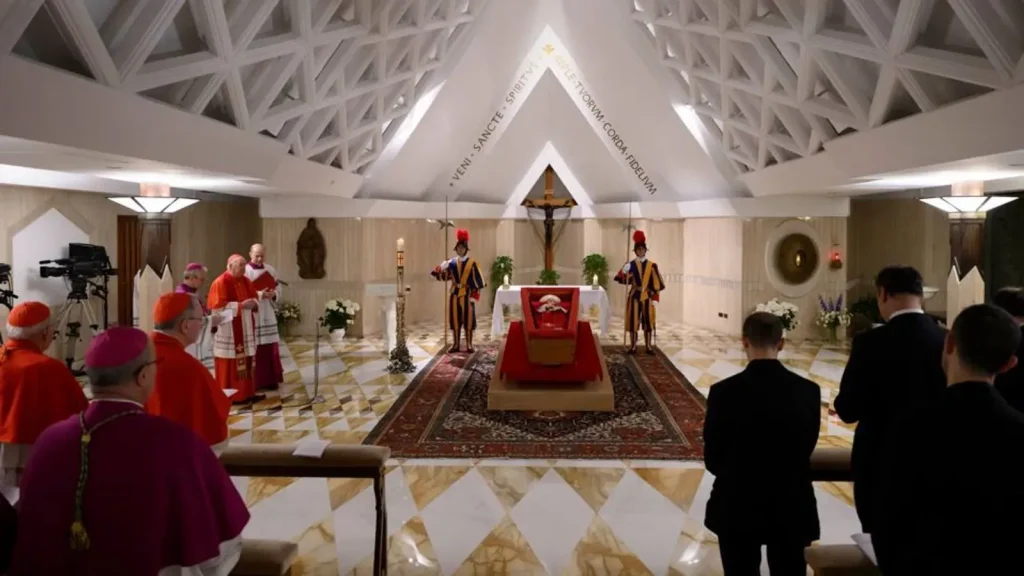The world mourns the loss of Pope Francis, who passed away on Easter Monday at the age of 88 due to a devastating stroke and cardiac arrest, as confirmed by the Vatican. This unexpected news sent shockwaves through his global following, especially considering his recent health issues, which included hospitalizations for pneumonia. Tributes have poured in, reflecting on his contribution to social issues and community outreach during his 12-year pontificate. As details emerge in the latest Pope Francis news, discussions around stroke causes and cardiac arrest effects have become prominent, reminding many of the frailty of life. His obituary will undoubtedly highlight not just his role as a spiritual leader but also his passionate advocacy for rights and inclusivity across various fronts.
In light of the recent passing of the pontiff, discussions surrounding the health challenges faced by religious leaders have surfaced, particularly concerning Pope Francis’s health struggles. Celebrated for his dedication and progressive views, the late Pope faced numerous medical battles, raising awareness about age-related health risks. His sudden decline serves as a stark reminder of the realities many elderly individuals confront, particularly in the face of serious conditions like strokes or heart problems. The reactions to his death echo a broader conversation about the impact of cardiac events and their prevalence in our society, emphasizing the importance of health management as one ages. As people reflect on both his life and untimely death, the global community continues to honor his legacy of compassion and advocacy.
The Impact of Pope Francis’ Death on the Global Community
The sudden passing of Pope Francis has sent shockwaves through the global community, with millions of followers mourning the loss of a revered leader. Over his 12-year papacy, Pope Francis advocated for numerous social justice issues, gaining admiration and respect from diverse populations around the world. His approachability and compassionate nature endeared him to many, and his absence will undoubtedly be felt, particularly among those who championed causes he supported, including migrant rights and climate change.
In places like Buenos Aires, where the Pope had deep roots, memorials and religious gatherings are taking place to honor his life and contributions. The Vatican’s announcement of his passing reverberated through churches and communities worldwide, reflecting on his significant impact in bridging divides between cultures and faiths. As people come together to remember Pope Francis, discussions about his legacy and the future leadership of the Catholic Church are also beginning to unfold.
Understanding Pope Francis’ Health Issues Leading to His Death
In the months leading up to his tragic death, Pope Francis faced several health challenges that raised concerns among his followers and the medical community. His hospitalization for double pneumonia highlighted the ongoing issues with his health as an 88-year-old leader of the Catholic Church. This hospitalization was a reminder of the vulnerabilities associated with aging, particularly for individuals in high-stress, high-profile roles.
Additionally, the stroke that ultimately led to his demise was particularly alarming for many, as strokes are often linked to cardiovascular health and can result from various factors such as high blood pressure and lifestyle choices. His health issues serve as a poignant reminder of the fragility of life, even for those in positions of great influence. His passing not only sheds light on the serious nature of stroke, which is a leading cause of death worldwide but also opens up discussions about preventative measures and the importance of healthcare accessibility for aging populations.
Analyzing the Causes of Pope Francis’ Stroke and Cardiac Arrest
Pope Francis’ death due to stroke and cardiac arrest emphasizes the crucial need to understand the causes and risk factors associated with these medical crises. Medical experts often indicate that strokes may result from a combination of lifestyle factors, including diet, exercise, and genetic predispositions. In Pope Francis’ case, while he experienced a decline in health, the specifics surrounding the incident—such as his recent pneumonia—highlight how underlying health issues can compound and escalate quickly.
A stroke occurs when blood flow to the brain is disrupted, leading to a lack of oxygen and nutrients that are critical for brain function. The implications of this are profound, not just for the individual, but for the entire community that rallies around them. Recognizing the symptoms and risk factors of stroke is essential for prevention and timely intervention, making knowledge dissemination a priority in health discussions, especially in light of Pope Francis’ unexpected health crisis.
The Legacy of Pope Francis: A Look at His Contributions
Pope Francis leaves behind a remarkable legacy of social advocacy and progressive change within the Catholic Church. Throughout his papacy, he worked tirelessly to promote ideals such as peace, inclusivity, and environmental stewardship. His efforts to bring attention to issues like climate change and migrant rights resonated deeply, inspiring many to engage in more compassionate practices in their daily lives.
Moreover, Pope Francis’ ability to connect with younger generations and marginalized communities helped to revitalize interest in the Church. As followers begin to reflect on his contributions, discussions about how future leaders can carry on his mission of global compassion and social justice are sure to emerge. His influence on both the Church and society at large will surely endure as a guiding light in the years to come.
Pope Francis Obituary: A Reflection on His Life and Work
The obituary of Pope Francis highlights not just his passing but also a remarkable life characterized by humility and service. Born Jorge Mario Bergoglio in Argentina, he rose through the ranks of the Catholic Church, ultimately becoming the first Pope from the Americas. His unique background and experiences shaped his worldview, leading to a papacy focused on mercy, dialogue, and understanding among different cultures and religions.
As we remember his life, we must also consider the vast impact he had during his tenure as Pope. His focus on the importance of community, care for the marginalized, and commitment to environmental sustainability derived from his personal faith and conviction. Echoing through the ages, Pope Francis’ philosophy of inclusivity and love remains a lasting part of his legacy, encouraging individuals worldwide to strive for a more just and compassionate society.
The Reaction to Pope Francis’ Death in Media and Society
Since the announcement of Pope Francis’ death, media outlets around the globe have been actively covering the events, reflecting on his papacy and the global reaction to the news. Public figures, leaders from different denominations, as well as ordinary citizens have expressed their condolences and shared personal memories of how the Pope influenced their lives. Such widespread coverage underscores the pivotal role he played in spiritual and social arenas, affecting millions.
In society, the news has sparked discussions about the future of the Catholic Church, as well as the pressing issues he championed. Many followers are left to ponder what his passing means for ongoing causes like social justice and climate activism, areas in which he was deeply involved. Reflecting on his life brings not just a sense of loss, but also an impetus to continue his work.
Health Awareness Post Pope Francis: The Importance of Regular Check-ups
The passing of Pope Francis raises a salient point about health awareness, particularly among the elderly and those in high-stress occupations. Regular health check-ups are critical for early detection and prevention of serious illnesses like strokes and heart disease, which are increasingly prevalent in society. The Pope’s health struggles serve as a reminder that vigilance regarding one’s health can make a fundamental difference in both longevity and quality of life.
As communities process the loss of the Pope, there is an increasing call for more robust healthcare initiatives and access to preventative care. Health organizations around the globe advocate for regular screenings and lifestyle changes that can significantly reduce the risks associated with heart disease and stroke. The narrative surrounding Pope Francis’ health issues can be a powerful motivator for others to take charge of their health and well-being.
Exploring the Stroke and Cardiac Arrest Connection
Understanding the connection between stroke and cardiac arrest is vital, especially in the context of recent high-profile cases like Pope Francis. Cardiac arrest occurs when the heart suddenly stops beating effectively, often triggering a stroke as a secondary condition due to the interruption of blood flow. Medical professionals emphasize that addressing cardiovascular health through lifestyle adjustments—such as diet, exercise, and stress management—can mitigate risks associated with both conditions.
Research indicates that there is a strong link between heart health and stroke occurrence, with factors such as high blood pressure, cholesterol levels, and diabetes playing crucial roles. As individuals reflect on the implications of Pope Francis’ health decline, it becomes clear that overall awareness and education around these issues must be heightened, particularly for aging populations. In doing so, communities can work toward reducing the impacts of these serious health threats.
Future Leadership in the Catholic Church after Pope Francis
The passing of Pope Francis ushers in a new chapter for the Catholic Church, with many now speculating about who will succeed him. Leadership dynamics within the Church will likely shift as cardinals and bishops reflect on the values that defined his papacy. The selection of future leadership may prioritize continuity of his vision of inclusivity and compassion, which resonated deeply with followers around the world.
Moreover, as discussions about the next Pope unfold, it raises broader questions about the Church’s direction on contemporary issues, including social justice, climate change, and interfaith relations. The coming months and years will be critical for the Catholic Church as it seeks to navigate these challenges while honoring the legacy left by Pope Francis.
Frequently Asked Questions
What were the circumstances surrounding Pope Francis’ death?
Pope Francis, aged 88, passed away on Easter Monday, April 21, 2025, due to a stroke and subsequent cardiac arrest. His death was confirmed by the Vatican following a series of health issues, including a recent hospitalization for pneumonia.
How did Pope Francis’ health issues contribute to his death?
Pope Francis had faced multiple health challenges, culminating in a stroke that caused his cardiac arrest. Prior to this, he had been hospitalized for double pneumonia, which raised concerns about his overall health leading to the tragic events of his passing.
What does the term ‘cardiac arrest’ mean in relation to Pope Francis’ death?
Cardiac arrest refers to the heart’s inability to pump blood effectively, which can be life-threatening. In the case of Pope Francis, the cardiac arrest followed a stroke and was the critical event leading to his death.
What is the importance of recognizing stroke causes in relation to Pope Francis’ health?
Understanding stroke causes is vital, as they can include blocked blood flow or ruptured blood vessels in the brain. In Pope Francis’ case, a stroke significantly impacted his health and led to his untimely death.
How did the Vatican confirm Pope Francis’ death and what was said in his obituary?
The Vatican announced Pope Francis’ death officially from his residence at the Chapel of St. Martha. His obituary highlighted his 12-year papacy, advocating for various social causes and his unexpected decline in health leading up to his death.
What impact did Pope Francis’ death have on his followers?
Pope Francis’ passing shocked many of his followers, especially considering his recent engagement with public figures like Vice President JD Vance just before his death. His advocacy for social justice and compassion resonates deeply with millions globally.
What are the warning signs of stroke that people should know based on Pope Francis’ case?
Common warning signs of a stroke can include sudden numbness or weakness, confusion, difficulty speaking, and loss of coordination. Understanding these symptoms can be crucial, as timely medical intervention is pivotal in stroke cases, as seen in Pope Francis’ situation.
What legacy did Pope Francis leave behind following his death?
Pope Francis leaves a significant legacy marked by his advocacy for migrant rights, climate change, and inclusivity for LGBTQ communities. His principled approach and teachings during his 12 years as Pope will continue to influence many.
| Key Point | Details |
|---|---|
| Pope Francis’ Death | Pope Francis died on Easter Monday, April 21, 2025, at the age of 88 due to a stroke and cardiac arrest. |
| Health Concerns | He had ongoing health issues, including a recent hospitalization for double pneumonia. |
| Death Announcement | The official announcement of his death was made at the Chapel of St. Martha. |
| Legacy | Pope Francis served for 12 years and was a strong advocate for migrant rights, climate change, and LGBTQ inclusion. |
| Last Meeting | The day prior to his death, he met with Vice President JD Vance. |
| Stroke Information | Strokes are the fifth leading cause of death in the U.S. and can cause significant disability. |
| Types of Strokes | Ischemic strokes account for 87% of cases, caused by blockages in cerebral arteries. |
Summary
Pope Francis death has left a profound impact worldwide, coming as a shock to many of his followers. His 12-year papacy was marked by efforts to address critical issues facing modern society. Despite previous health concerns, his final moments caught many by surprise, highlighting the unpredictable nature of health crises like strokes, which remain a leading cause of mortality. This event will surely resonate in history as both a loss for the Catholic Church and a significant moment in global advocacy.



